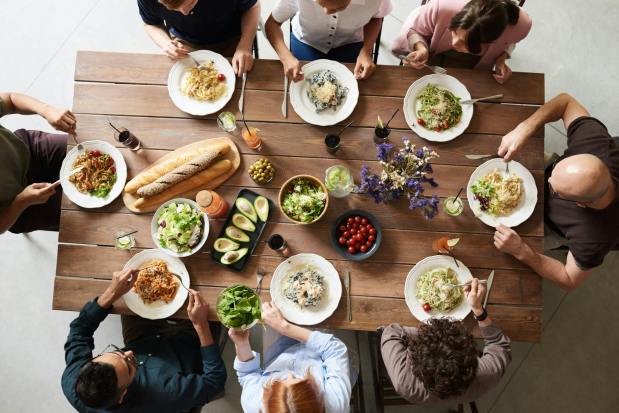Readings for the day (Easter 5B, Sunday, April 27, 2024):
Dear friends in Christ, grace to you and peace from God our Father, and our Lord and Savior Jesus the Christ. Amen.
This last week, I had the opportunity to explain to my son what a landline phone is. For those of you who know what this is, try explaining it to someone who’s never used one, or even seen one. It’s not as easy as you would think.
We were out driving somewhere, when a call came through on my phone. My son looked at the screen, saw the name of the person calling, and then noticed something that he hadn’t seen before. Next to the person’s phone number, there was the word “Work.”
After the call, he asked about this word. What’s a work number? So, I went into this long explanation about landline phones, and that before cell phones the only way to get ahold of someone was to call the phone at their home or where they worked. And if the person you were trying to reach wasn’t at either of these two locations, then you’d just have to wait to talk to them until later. It was no big deal at the time, because we didn’t know any different.
Today, we have endless opportunities to remain connected with each other. We don’t have to wait for someone to get to work or get back home, in order to get ahold of them. We can just pick up the phone and call them. We have these small communication devices that allow us to remain connected to each other wherever we go. Except, what happens when you forget your phone? What happens when you leave for work or school without remembering to grab your phone? Do you feel lost? Do you get this sense of feeling disconnected? Without your phone, you can’t get ahold of anyone, and no one can get ahold of you. Before the age of cell phones, we did this all the time. But now that we carry these little phones with us wherever we go, when we leave home without them, we feel lost. We feel incomplete. We feel disconnected.
Being disconnected from the people that we love isn’t something that we strive to achieve. Instead, we do whatever we can to remain connected with those we care about. We keep that phone near us, so that we can text our friends whenever we want. We remember to grab that phone so that we can call our parents and our children and our siblings. We like to remain connected with those who we care about.
As Jesus is speaking with His disciples, they didn’t have cell phones to stay connected with each other. And Jesus knew that He would soon be leaving them as He continued His journey to the cross. So, Jesus gives them is metaphor, this image, of a vine and some branches. And Jesus says, “I am the vine; you are the branches. Those who abide (or remain) in me and I in them bear much fruit.”[1] Those who remain connected to Him, Jesus says, will bear much fruit. Those who remain connected to Jesus will be great and will do great things for God’s kingdom. And then Jesus continues by saying, “Because apart from me you can do nothing.”[2]
Nothing. You can do nothing. Similar to when you forget your phone at home, you can’t communicate with others. You feel lost and disconnected. When you are disconnected from Jesus, you can do nothing. When you are disconnected from God, it’s like forgetting your phone at home. You’re lost and you don’t feel quite right. Now being connected with God, being connected to the vine, Jesus says, is for a purpose. That just as the branches of the grapevine serve a purpose, with you being connected to God, serves a purpose. And that purpose is to bear fruit for God’s kingdom. To carry out God’s mission in the world. To spread and share the Good News of Jesus and the empty tomb. Bearing fruit for God’s kingdom doesn’t mean that you need to stand at street corners asking if people have found Jesus. It doesn’t mean that the church needs to pay for a billboard on the interstate.
There are many other ways to bear fruit for God’s kingdom, and it all begins by remaining connected to God’s Word. Because through our connection to God’s Word, the hope, the peace, the joy that is experienced through this connection, spills over into your daily life. Recently I was visiting with someone who was certain that the world was going to hell. That there’s so much loss and destruction and carelessness and sin happening that this person was convinced that there was no hope for any of us. So, I told this person that I’m actually quite hopeful for the future because there are many wonderful signs of great things happening all around us – as long as we’re willing to open our eyes to see them. Yes, the negative stuff is out there, but so is the positive stuff. And we will focus our attention on the things that interest us. You don’t have to focus on the negative. You get to choose what you focus on. And when you focus on the hope and peace and joy that comes from God’s saving work, that energy and excitement will spill over into your daily life. And that alone spreads the Good News of the empty tomb.
Now, remaining connected to Jesus through God’s Word, you not only are giving a mission, a purpose that’s filled with this hope, peace, and joy, you’re also given a promise. Look again at what Jesus says about the vine and the branches. He says, “I AM the vine; you are the branches.”[3] Notice here Jesus doesn’t say that you have been the branches, or that you will be the branches someday. No, Jesus says that you are the branches. Meaning right now, in the present. You are the branches now. You belong to God, now. You are connected to God, now.
This connection between the vine and the branches shows that there is a mutual dependence for one another. As the branches, you need the vine. You need Jesus. Branches that are apart from the vine do not survive. You need this connection with Jesus. But what is a vine without branches? God needs you, too. Just as the branches can’t survive without the vine, God’s kingdom will not survive without you. Jesus is the vine. You are the branches. You are eternally connected to God through the cross and the empty tomb. Alleluia! Christ is risen! He is risen indeed. Alleluia! Amen.
© 2024 Anthony Christoffels. All Rights Reserved.
[1] John 15:5, NRSV
[2] Ibid
[3] Ibid




